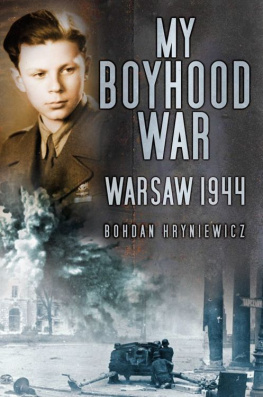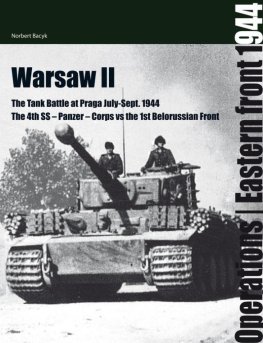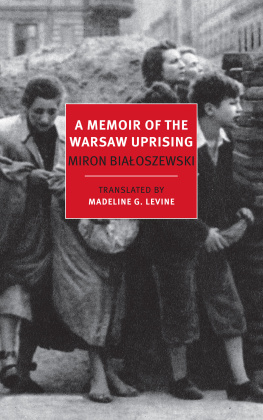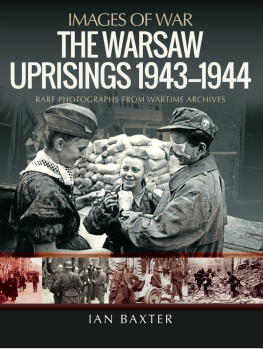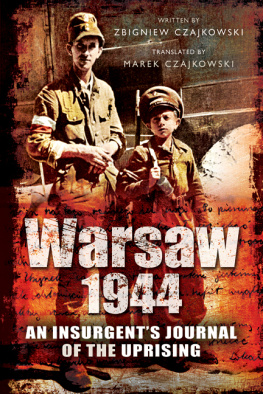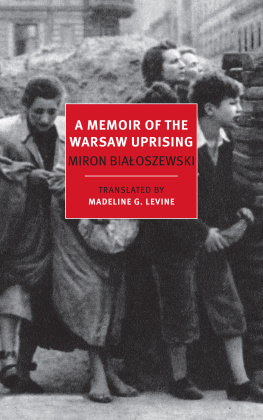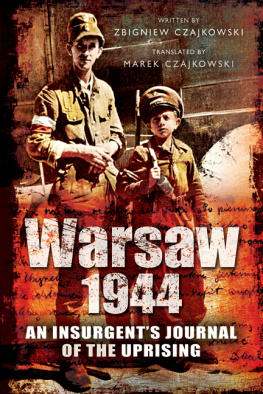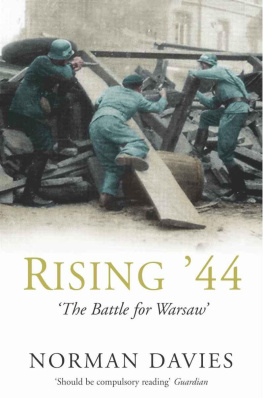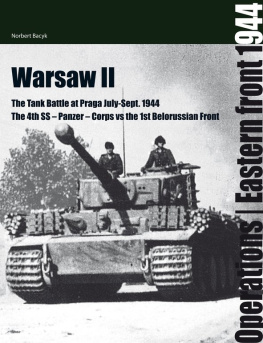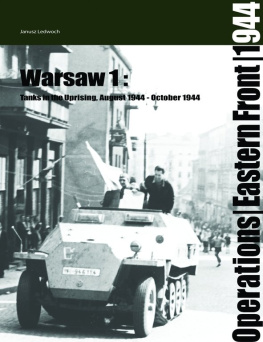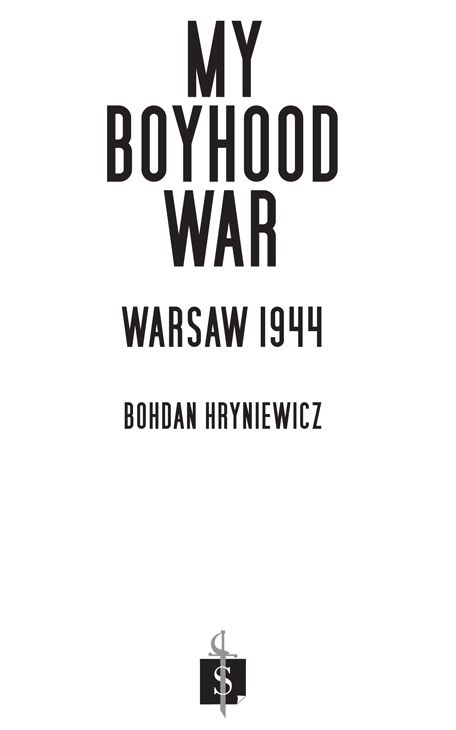
Told with the wisdom of one who survived the deafening noise of war, as well as the deafening silence of the peace that followed, this riveting story of heroism and betrayal is indispensable for understanding political events today. Narrated with elegance, gravity and a writers eye for the harrowing details that shaped life on the front, Hryniewiczs book reminds us all of the urgency of the past
Krystyna von Henneberg
Historian
An intensely personal yet politically significant account of a major World War II battle It also enhances a better understanding of Russias current goals in EastCentral Europe.
Zbigniew Brzezinski
Former US National Security Advisor
Hryniewicz engrossing and detailed memoir of the Warsaw Uprising adds the unvarnished insights of an adolescent runner for the underground to a story that never fails to move the reader with its tragic consequences for Poland and for the Poles.
Norman M. Naimark
Professor of East European Studies, Stanford University
A fascinating personal memoir
Halik Kochanski
Historian and Author
This first-hand memoir is a welcome addition to our knowledge of what [the Warsaw Uprising of 1944] meant for ordinary people.
Count Adam Zamoyski
Historian and Author
To Andrzej,
and all the boys and girls who so bravely
gave their lives in Warsaw, 1944.
When I wrote my dedication to my older brother Andrzej and all the young boys and girls who died in the sixty-three days of the Warsaw Uprising I automatically wrote gave their lives for Poland. There is no question in my mind that they believed they did. So did I. But did they really? What did they achieve by giving their young and very promising lives? We will never know. It has been, and will be, debated for years.
On one hand, there was the complete destruction of Warsaw, the deaths of over 200,000 human beings, the loss of the Polish nations most valuable human asset. The impact on Polish society and potential, from the loss of its best and brightest, can never be assessed. We all know now that the Uprising was doomed from day one. Stalin deliberately stopped the Russian Army from liberating, or even helping Warsaw, giving the Germans free rein. The Allies, turning a blind eye, did not help either.
After the Second World War ended, nobody talked about it. The story of the Battle for Warsaw, the largest and longest urban battle of the Second World War, between lightly armed, irregular forces and the most experienced, well-equipped army of the day, was virtually unheard of until the fall of communism. It was simply an inconvenient truth.
The Germans obviously did not want to have their war crimes exposed: the indiscriminate murder of combatants and a defenceless civilian population men, women and children the bestial murder of wounded soldiers and nurses; rapes; the unnecessary destruction of an evacuated city where, after 80 per cent of the buildings were looted and burned, the remaining structures of any historically significant buildings were systematically dynamited.
The Russians could have taken Warsaw, and at little cost, in the first few weeks of the Uprising. They opted instead to give the Germans total freedom to liquidate that element of the Polish population they knew would always resist communism. They also prevented the Allies from airdropping badly needed supplies to the insurgents.
The Allies particularly the US under President Roosevelt did not want to disclose that they had sold out Poland, and the rest of Central Europe, to Stalin at the 1945 Yalta Conference.
On the other hand, many believe that the rise of Solidarno (Solidarity), which later precipitated the fall of communism, would not have happened without the Uprising. I believe (or do I desperately want to believe?) that those lost lives, given so willingly, were not lost in vain. That the generation that produced Solidarity was inspired by those sacrifices, as they were by the sacrifices of their forebears in the Polish-Bolshevik War of 1920, the failed Uprisings of 1863 and 1831, and the Polish participation in the Napoleonic Wars.
* * *
In November 2009, at the celebration of Independence Day at the Polish Embassy in Washington, the Polish Ambassador presented me with the Commanders Cross with the Star of the Order of Merit, awarded by the President of Poland. In my acceptance speech I said (or rather I tried to say as I became overwhelmed with emotion) that the Chinese curse May you live in interesting times applied to me. I wanted to share the three most significant days of my life during those interesting times: the saddest day was 19 September 1939, when I woke to the sound of Russian tanks arriving in Wilno; the happiest day was 1 August 1944, when the Polish national colours, red and white, once again flew from the highest building in Warsaw; and the most disappointing day was 3 October 1944, when my commanding officer would not allow me to go to a prisoner of war camp with the other soldiers of our battalion.
* * *
For many years my children, and others, have been after me to write my memoirs. I did live in interesting times, times of significant change in Poland. I am old enough to remember life before the Second World War in the Second Republic of Poland, newly reborn in 1918. I also remember conversations and stories of life before the First World War, of times and a way of life that will never return. I lived through the Second World War, the Russians crossing the Polish border seventeen days after the Germans in 1939; the brief annexation of Wilno by the Lithuanians; the return of the Russians; the arrival of the Germans in June 1941; the German occupation and Warsaw Uprising in 1944; the re-entry of the Russians and the end of the Second World War in May of 1945; the communist takeover and the creation of the Polish Peoples Republic; and finally the fall of communism and the rebirth of the Third Republic of Poland. I lived to see, once again, a free, independent and democratic Poland.
I would like to stress that my experiences in the Second World War and particularly in the Warsaw Uprising were not at all unusual or unique. Many boys and girls my age, both younger and older, took an active part in the fighting and the Polish Underground. The figures speak for themselves. After the capitulation of the Uprising, about 15,000 men, 2,500 women and 1,100 adolescent boys were transferred to German POW camps. One of those camps, Stalag 334 at Lamsdorf, held 5,800 men and boys, and 1,000 women including 1417-year-old girls. On 18 October 1944, the Germans held a special roll call for underage POWs. From about 550 young POWs present, there were eight between the ages of 11 and 13, fifty-seven between 13 and 14, 115 aged 15, and 175 aged 16. Among them were two recipients of the Order Virtuti Militari, the highest Polish military decoration for valour, eighteen recipients of the Cross of Valour and 206 who received promotions.
* * *
I thank my daughter Elisabeth and my cousin Andrew Korab, who edited parts of this memoir. I am grateful for the support and encouragement of all my children, Andrew, Sarah, Elisabeth and Gregory. My special thanks to Elisabeth, who on her own decided to be my literary agent and was successful in having this book published.
I would like to thank my wife Anne, whose love and friendship I cherish. Her strength and support were invaluable through the difficult process of reliving some of the experiences while writing.
I dedicate this book to the memory of two of the most important women in my life. My mother Janina (19062001), who awed and inspired me with her strength, fortitude and sang-froid in the face of lifes adversities, her ability to go on and never give up under the weight of personal loss, the love that she always gave Andrzej and me. To Linda Kelly Hryniewicz (19372001), always loved and never forgotten, life companion of forty-two years, mother of our children. And to the new generation: my grandchildren Janina (Nina), Sophia-Linda, Alexander, Bryce and Neve in the hope that they never have to live in interesting times.
Next page
